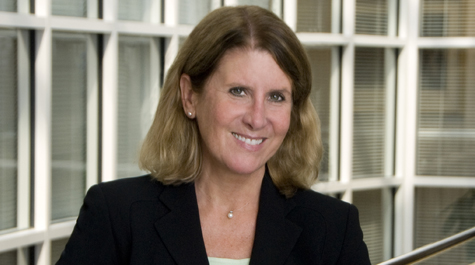Christie S. Warren Receives Fulbright Scholar Award for Research in Sweden
Professor Christie S. Warren of William & Mary Law School has been awarded the Fulbright-Lund Distinguished Chair in Public International Law for the 2024-25 academic year. Warren will be teaching at Lund University and conducting research at the Raoul Wallenberg Institute of Human Rights and Humanitarian Law in Sweden. Her research will focus on the role of constitutions and foundational charters in stateless communities that lack political sovereignty.
“I am very grateful to be able to expand my research into the area of constitutional protection for the growing number of stateless people forced to leave their homelands due to politics, conflict and scarcity of resources,” Warren said. “These communities represent a frontier in the world of human rights and legal protection.”
Although constitutions serve a number of commonly accepted purposes, Warren says they also play important roles for groups lacking formal recognition and political sovereignty. Her project seeks to explore nascent legal questions including whether forcibly displaced people lose protection of basic rights when they are unwillingly deprived of their homelands and whether constitutions not tethered to political sovereignty are enforceable in domestic and international courts.
“A surprising number of stateless communities, including Palestinians, Tibetans, Roma, and Kurds, maintain their own constitutions despite lacking a geographic homeland,” Warren said. “Ultimately, I seek to analyze whether statelessness, a lack of international recognition and an absence of foundational documents ensuring political rights and social protection contribute to genocide.”
Warren is Professor of the Practice of International and Comparative Law and Director of the Center for Comparative Legal Studies and Post-Conflict Peacebuilding at William & Mary Law School. During her distinguished career she has made significant contributions to the study of international law and human rights.
“Professor Warren’s accomplishments on the international front are precise, targeted, and absolutely vital to human rights issues,” said A. Benjamin Spencer, Dean and Trustee Professor of William & Mary Law School. “This Fulbright is an affirmation of her tireless efforts, and we look forward to following her progress this coming academic year.”
Warren holds a B.A. with Distinction from the University of California at Berkeley, a J.D. from the University of California at Davis, and a Certificate in Mediation from the Harvard Mediation Program. Her areas of specialization include Comparative Law, Comparative Constitutional Law, Post-Conflict Justice and the Rule of Law, Transitional Justice, Islamic Law, Public International Law, and International Human Rights Law.
Warren served for 16 years as a criminal defense trial lawyer in California, specializing in the defense of death penalty cases, before turning to international legal development work in conflict and post-conflict contexts.
She has designed, implemented, and assessed constitutional, judicial, legal, and academic programs in more than 58 countries throughout Africa, Central and East Asia, Latin America, and the Caribbean, Central and Eastern Europe, the Middle East, Russia and the Newly Independent States, the Balkans, and East Timor. She was appointed Supreme Court Fellow at the Supreme Court of the United States and served as the Senior Expert in Constitutional Issues on the United Nations Department of Political Affairs Mediation Support Unit Standby Team. She has advised on constitutional issues and processes in Haiti, Iraq, Kosovo, Kyrgyzstan, Moldova, Somalia, Sudan, and Ukraine and served as a Legal Advisor during the Darfur Peace Talks.
“In a way, this Fulbright brings my career full circle. In my years litigating, my field assignments and my academic research, my focus has been on those who are voiceless.”
This will be Warren’s second Fulbright Distinguished Chair. She was named the 2016–17 Fulbright Schuman Distinguished Chair at the European University Institute in Florence, Italy, where she taught and researched the role various legal systems play in creating, maintaining, and recovering from conflict. Her research from that award was published in the Cornell International Law Journal.
Warren has also served as Visiting Professor of Constitutional Law at the Universidad Autónoma de Madrid and Visiting Professor of International Law at Sapienza University in Rome.
Under appointment by Chief Justice William H. Rehnquist, Warren served as the 1998-1999 Supreme Court Fellow at the Supreme Court of the United States. Under appointment by Chief Justice John Roberts, she served as Supreme Court Fellows Commissioner from 2012 to 2018. She is the recipient of the Administration of Justice Award, awarded by the Supreme Court Fellows Alumni Association, “In Recognition of Significant Contributions to the International Administration of Justice and the Rule of Law.”
Warren is especially grateful to Professor Adam Gershowitz, the James D. & Pamela J. Penny Research Professor and Hugh & Nolie Haynes Professor of Law at William & Mary Law School, for recommending her for a second Fulbright.
“Support from the W&M faculty has been instrumental in my ability to move forward with my research on strategies for post-conflict reconstruction. Adam was one of the earliest supporters of my desire to expand my research into an area not yet covered in international law. Without his recommendation, my project proposal would have been far weaker. I am looking forward to benefitting from the strength of the academic community at Lund University and the resources of the Raoul Wallenberg Institute next year.”
The Fulbright Program is an international academic exchange program founded in 1946 with an ambitious goal — to increase mutual understanding and support friendly and peaceful relations between the people of the United States and the people of other countries. Today, the U.S. government oversees an extensive suite of fellowships and scholarships in partnership with more than 160 countries worldwide.
Since its inception, the Fulbright Program has empowered more than 400,000 dedicated and accomplished students, scholars, artists, teachers, and professionals from diverse backgrounds. Scholars have enhanced their skills and connections; gained invaluable international insights; returned home to share their experiences with their students and colleagues; and enriched their local communities with a wider perspective.
